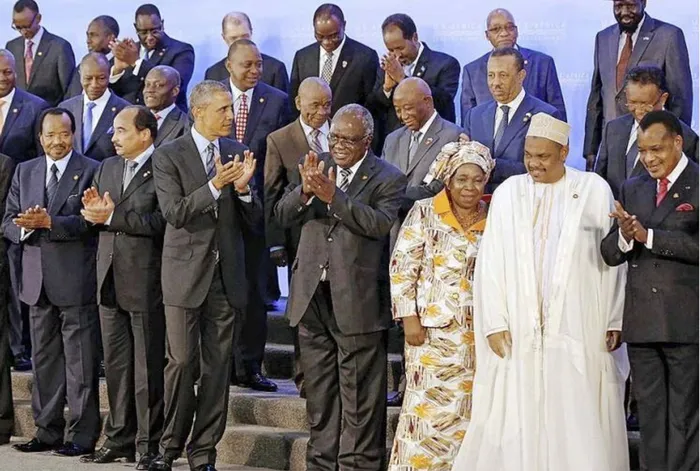Biden revives US-Africa Summit

Picture: Reuters – Former US President Barack Obama gathers with other leaders for a group photo at the US-Africa Leaders Summit in Washington in 2014. Pictured in the front row, from left, are Cameroon’s President Paul Biya, Mauritania’s President Mohamed Ould Abdel Aziz, Obama, Namibia’s President Hifikepunye Pohamba and AU Commission Chairperson Nkosazana Dlamini Zuma, Comoros’s President Ikililou Dhoinine and Congo’s President Denis Sassou Nguesso.
By David Monyae
The United States (US) President Joe Biden has revived the US-Africa Leaders Summit, launched by former President Barack Obama in 2014. The Summit was shelved by former president Donald Trump’s administration when it assumed power in 2016. For the Trump administration, Africa was not a priority in the US foreign policy a disposition poignantly captured by Donald Trump’s vulgar and gross characterisation of African countries.
Nonetheless, upon taking over from Donald Trump in 2021, Biden immediately made it clear that Africa was part of his administration’s foreign policy priorities when he addressed the 34th African Union (AU) Summit barely a month after his inauguration as president. In his address, President Biden pledged solidarity with the African continent in addressing urgent global challenges including the Covid-19 pandemic, fragile security situation and climate change among others. Africa featured prominently in Biden’s proposed Build Back Better World (B3W) policy adopted by the Group of 7 (G7) Summit in June 2021. The B3W offered to strike “a new deal with Africa” in promoting green growth, infrastructure investment, digital technology development, robust health systems and gender equality. Africa would also be embraced in the Partnership for Global Infrastructure and Investment (PGII), which was a replacement of the B3W with Biden as the chief proponent.
In a further demonstration of his acknowledgement of Africa’s importance, Biden deployed his top diplomat, the Secretary of State Anthony Blinken, to Africa twice in less than a year. Blinken’s second trip to Africa in August 2022 saw him unveiling the US Strategy Towards Sub-Saharan Africa in Pretoria, South Africa. The Strategy presented a laundry list of objectives which will guide the US interaction with Africa in the coming years, namely, promoting good governance, advancing democracy, recovering from the pandemic and economic development, and combating climate change. As such, the second instalment of the US-Africa Leaders Summit has been a long time coming.
The Summit represents perhaps a new phase or the latest episode of the long history of US-Africa diplomacy. The successive episodes of the relations between the two sides ovebert or so decades have been direct products of the prevailing global environment. Global megatrends such as decolonisation in the 1960s, the US-Soviet Union Cold War stretching from the 1950s to 1990, the rise of the US as the sole superpower in the 1990s and the September 11 terror attacks on the US in 2001 have significantly shaped the dynamics of the US-Africa relations.
The present phase of the relationship, which will take a definitive shape at the upcoming Summit, is no exception. Global issues such as the rise of China, Russia-Ukraine war and its impact on global economy and security, climate change, the Covid-19 pandemic, and the reform of global governance framework to mention a few will figure largely in the deliberations between the two sides.
The Summit will provide an opportunity to close ranks and find common ground between the US and Africa which do not see eye to eye on most of the issues. For example, while Africa has firmly embraced China as an ally, Washington remains sceptical about China’s influence on Africa and the broader world even warning Africa of China’s possible colonial ambitions in the continent. About half of the African countries have resisted the US campaign to isolate Russia in the wake of its invasion of Ukraine by abstaining or voting against resolutions condemning Russian at the United Nations. Quite the contrary, African countries have warmly received Russia’s foreign minister Sergei Lavrov and are due to hold the Russia-Africa Summit in 2023.
Africa’s co-operation with the US’ global rivals serves to demonstrate that the Continent has alternatives and will give it some form of leverage in its deliberations with Washington. Moreover, the US and Africa have also differed on the handling of the Covid-19 pandemic. African leaders have accused the US and its allies in the West of vaccine nationalism, which saw them use their financial muscle to hoard more Covid-19 vaccines than they needed thus stifling supply to poor developing countries.
The US also did not support Africa’s efforts to have the intellectual property rights on vaccines waived to enable their production on the Continent, which would have helped overcome the supply bottlenecks. Coming to the global governance architecture, the US and Africa’s respective sentiments and positions could not be more different. The US has been the chief underwriter of global institutions such as the World Trade Organisation (WTO), the World Bank, the International Monetary Fund (IMF) and the United Nations Security Council (UNSC) among others. Africa has for a long time demanded the overhaul of these institutions citing the underrepresentation and the unjust treatment the continent has suffered in these entities.
As the chief beneficiary of the status quo, the US has been cold and at times pushed back on demands for reforms. It remains to be seen whether the Summit will help the two sides find a point of convergence on these key issues that will define the relationship going forward.
David Monyae is Associate Professor of International Relations and Political Science; he is also , and Director for the Centre for Africa-China Studies at the University of Johannesburg.
This article was exclusively written for The African. To republish, see terms and conditions.